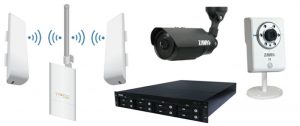Traditional wired security cameras are attached to the receiving end of the video footage with extensive wires, generally the RJ59 coax cables that are also used to transfer television signals. These cameras also need power cable that can be connected to the power source separately or through a Siamese coax cable. But with the advancement of modern technologies, wireless cameras are now available in the market. These cameras do not need cables to transfer video footage. Instead, they transfer signals through Radio (RF) waves. The cameras need to be connected to a WiFi router which can process or transmit the footage to a computer or NVR.

There are Wireless IP cameras available in the market too. These cameras can directly upload the video recordings to a cloud or IP address which can then be viewed remotely. Wireless cameras are inexpensive and you don’t have to buy extra cables to connect them to a monitor. Some WiFi cameras need to be connected to a power source, but most of them can work on batteries. Installing Wireless cameras is easy. You just have to drill the holes in the wall, fix the camera to it and configure the camera on your computer.
Wireless cameras have a range over which they can transmit signal. Usually, it is anything between 100 to 500 feet. The hub has to be in this range to gather the signal that is transmitted. Also if there are obstructions like brick walls, concrete floors or large trees, etc the signal is weak. So keeping these things in mind you have to plan the placement of the wireless CCTV. The signal range also depends on other wireless devices in the vicinity and the building material of the home.
In spite of the disadvantages, one of the important advantages of wireless security cameras is their absence of wiring itself. A miscreant cannot cut off the wires and shut off the video recordings because there are no wires to cut. Also, another advantage of wireless CCTV is that they are very portable. You can simply unscrew them from the wall and take it with you anywhere you want.
However, there are certain benefits of wired CCTV cameras over their wireless counterparts that cannot be ignored. Wired cameras give better resolution than most wireless ones and there is no chance of losing the signal strength whatever the environment is like. As long as the cables are connected you will keep getting clear images and audio from the wired cameras. Also, wired cameras do not need periodic change of batteries. Wired cameras are also more robust and often are weatherproof and vandalproof. There is also no possibility of hacking into the wired camera system which is a potential threat to wireless cameras.
So it is difficult to say which one is better, the wired cameras or wireless cameras. It depends on the situation and circumstances. If you are looking for a steady long-term solution wired cameras may be the one you are looking for. However if you are looking for a quick and temporary fixture without the help of a professional installer, wireless cameras are the solution.

Awesome post, thanks for sharing.